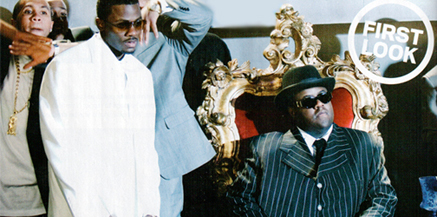Movie Review: Notorious
By Matthew Huntley
January 20, 2009
BoxOfficeProphets.com

Like many artists, The Notorious B.I.G., a.k.a. Biggie Smalls, was a boy chasing a dream and aspiring to manhood. His real name was Christopher George Latore Wallace, played with a forceful presence by Jamal Woolard. The Brooklyn-born Wallace was only 24 when he was slain by an unknown gunman in Los Angeles, but even at such a young age, he achieved in his short career what most people strive for their entire lives - the ability to change the way people think. But despite his wealth and influence, Biggie was starting to realize fame and fortune weren't all they're cracked up to be. Shortly before his death, he realized the most important things in life are the people who love you. If Biggie knew this at 24, there's no telling how far he could have gone.
Director George Tillman Jr. and screenwriters Reggie Rock Bythewood and Cheo Hodari Coker provide the basics for a music biopic of this sort, including a limited background on Chris's upbringing in Brooklyn, where he was raised alone by his mother (Angela Bassett) and began dealing drugs at age 12. Even though he was smart and earned good grades, Chris dropped out of high school to deal full-time and ended up serving nine months in jail. He would have gone back, too, had his friend Damion (Dennis L.A. White) not taken the fall for his weapons charges. Damion knew Chris had a gift and he didn't want to see him waste it.
That gift, of course, was rapping and storytelling. It started out as a hobby and Chris would casually entertain people on the streets, but it transformed into a career. At 19, "Biggie" signed his first record deal with a relatively unknown producer named Sean "Puffy" Combs (Derek Luke). Combs would go on to build an enormous empire with his Bad Boys record label and Biggie would become one of his most successful clients. Many attribute Biggie's first album, "Ready To Die," to putting East Coast rap back on the hip hop scene, which had been dominated by West Coast artists.
I mentioned Tillman Jr. gives us the basics, and while the overall arc of the story is somewhat standard and predictable for a music biopic - artist rises to fame --> artist has affairs and gets in over his head --> artist's life is abruptly cut short (you know the drill) - the movie contains a ceaseless energy level. I looked beyond the conventional story and became enthralled with the zippy storytelling. I sensed the movie rushing itself in order to cover all the major bullet points of Biggie's life, including his relationships with Lil Kim (Naturi Naughton), Faith Evans (Antonique Smith) and Tupac Shakur (Anthony Mackie), but it tells us what we need to know, if not all we want to know. It's not terribly in-depth or nuanced, but it's entertaining and keeps us engaged.
As you may already know, Biggie will forever be linked to Shakur, who started out as Biggie's friend but later became his greatest rival. Shakur accused Biggie and Puffy of setting him up for a robbery in the lobby of their shared Manhattan music studio, where Shakur was shot several times and lost thousands of dollars worth of jewelry. Biggie denied the accusations, and the movie recreates the incident from his point of view. It also explains how it ignited the infamous East Coast-West Coast hip hop feud, a subject that could easily make for an intriguing film all its own, which is probably where Biggie & Tupac comes in.
As for Notorious, it does become heavy-handed towards the end and the film overplays the impending doom of Biggie's death on March 8, 1997. By this time, the filmmakers desperately want us to realize Biggie has turned over a new leaf as far as his priorities are concerned. He tells his daughter, "No matter what, never let anyone call you a b*tch," and there's a blatant scene in which he gathers around the dinner table and says, simply, "Thank you." We get it - he's a changed man. He's got new values. The movie lays on the emotion too heavily, but for the sake of Biggie's family, we can understand why.
Because the real Sean Combs executive produced Notorious, I'm fairly confident most of the events in the movie are accurate, at least from Combs' point of view. But even so, I don't go to Hollywood movies for truth. I go first for mood, tone and drama, hoping each of these will help create a fair a representation of the truth. After seeing this movie, I now feel like I know the broad outlines of Biggie's life, which was quite a remarkable one. Fans of The Notorious B.I.G. will likely feel a bittersweet affection towards it and will recall just how much Biggie changed their lives. For the uninformed, like me, I appreciated how the movie, in a moving and entertaining way, made me aware of this larger-than-life artist. I now want to learn more. It's amazing how Biggie continues to influence people more than a decade after his death.
NOTE: After Notorious, it would be interesting if Hollywood made a Tupac Shakur movie, not so much because of the East Coast-West Coast feud, but because Tupac was just as influential on the hip hop scene, if not more. Like Biggie's, Tupac's story is worth telling and I'm sure die-hard fans, as well as the uninformed, are yearning for it.